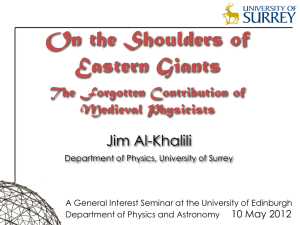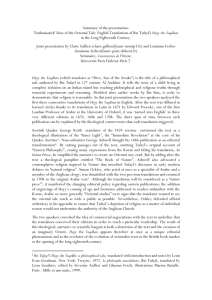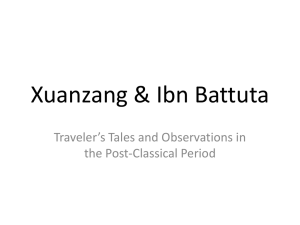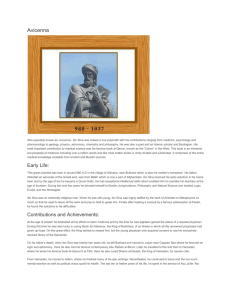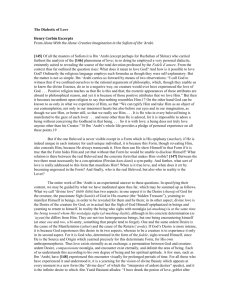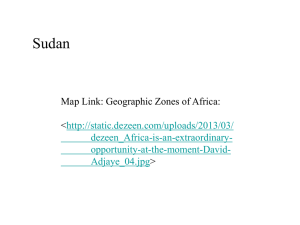THE NOTION OF RELIGION IN THE FUSSU AL
advertisement
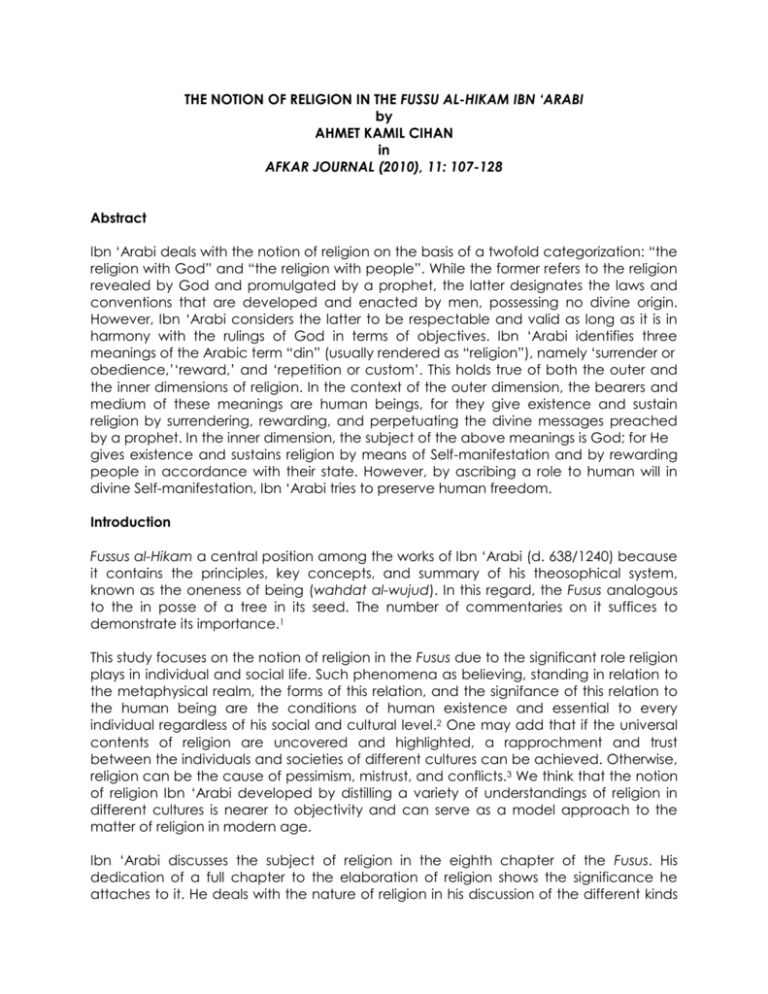
THE NOTION OF RELIGION IN THE FUSSU AL-HIKAM IBN ‘ARABI by AHMET KAMIL CIHAN in AFKAR JOURNAL (2010), 11: 107-128 Abstract Ibn ‘Arabi deals with the notion of religion on the basis of a twofold categorization: “the religion with God” and “the religion with people”. While the former refers to the religion revealed by God and promulgated by a prophet, the latter designates the laws and conventions that are developed and enacted by men, possessing no divine origin. However, Ibn ‘Arabi considers the latter to be respectable and valid as long as it is in harmony with the rulings of God in terms of objectives. Ibn ‘Arabi identifies three meanings of the Arabic term “din” (usually rendered as “religion”), namely ‘surrender or obedience,’‘reward,’ and ‘repetition or custom’. This holds true of both the outer and the inner dimensions of religion. In the context of the outer dimension, the bearers and medium of these meanings are human beings, for they give existence and sustain religion by surrendering, rewarding, and perpetuating the divine messages preached by a prophet. In the inner dimension, the subject of the above meanings is God; for He gives existence and sustains religion by means of Self-manifestation and by rewarding people in accordance with their state. However, by ascribing a role to human will in divine Self-manifestation, Ibn ‘Arabi tries to preserve human freedom. Introduction Fussus al-Hikam a central position among the works of Ibn ‘Arabi (d. 638/1240) because it contains the principles, key concepts, and summary of his theosophical system, known as the oneness of being (wahdat al-wujud). In this regard, the Fusus analogous to the in posse of a tree in its seed. The number of commentaries on it suffices to demonstrate its importance.1 This study focuses on the notion of religion in the Fusus due to the significant role religion plays in individual and social life. Such phenomena as believing, standing in relation to the metaphysical realm, the forms of this relation, and the signifance of this relation to the human being are the conditions of human existence and essential to every individual regardless of his social and cultural level.2 One may add that if the universal contents of religion are uncovered and highlighted, a rapprochment and trust between the individuals and societies of different cultures can be achieved. Otherwise, religion can be the cause of pessimism, mistrust, and conflicts.3 We think that the notion of religion Ibn ‘Arabi developed by distilling a variety of understandings of religion in different cultures is nearer to objectivity and can serve as a model approach to the matter of religion in modern age. Ibn ‘Arabi discusses the subject of religion in the eighth chapter of the Fusus. His dedication of a full chapter to the elaboration of religion shows the significance he attaches to it. He deals with the nature of religion in his discussion of the different kinds of religion. Going into no semantic and terminological details, he addresses religion in the context of the relation between the inner and outer dimensions of being, expressing his views by the means of mystical language.4 While he avails himself of the Islamic religious texts and the Arabic linguistic conventions in discussing religion from the outer perspective, he, in the context of the inner dimension, interprets religion in line with his theosophical system, known as the oneness of being (wahdat al-wujud). The Outer Dimension of Religion Ibn ‘Arabi carries on his discussion of this dimension on the basis of the Qur’an and the conventions of the Arabic language. But he concerns himself not with all the verses related to religion, nor with all the sematical dimensions of the verses involved;5 rather, he focuses exclusively on the verses and their literal senses that he considers to be relevant to his theosophical system. Mentioning no definition of religion, he immediately begins to discuss the subject by citing two kinds of religion, which can be viewed as a classification of religion. As required by the nature of classification, there must be a quality common between the two kinds of religion that enables us to predicate a common judgment upon them. So he suggests two kinds of religion: the religion with God and the religion with people. The Religion with God Ibn ‘Arabi argues that the people who have the religion with God, learned religion either directly from God or from the people whom God taught it.6 While the first are prophets, the second are the Posessors of intuitive knowledge (‘urafa); one needs to bear in mind the association this word has with the term “ma‘rifa”, i.e., gnosis or intuitive knowledge. Ibn ‘Arabi explains the religion with God as the following: God chose this religion and assigned a high position to it. However, he does not clarify from among which things He chose it. From the following Qur’anic verse, he deduces the notion that this religion is chosen by God Himself: “The same did Abraham enjoin upon his sons, and also Jacob, (saying): O my sons! Lo! Allah has chosen for you the religion; therefore die not save as men who have surrendered.”7 Ibn ‘Arabi interprets “the men who have surrendered” as those who surrendered to the religion with God and takes the article “al” in the word “al-dan” as a definite article that designates this category of religion. In other words, the word “al-dan” came in definite form to refer to the religion that is familiar to all people and present to all the minds. Thus, the religion possesses a meaning known to Abraham and his sons, to Jacob and his sons and lastly to those who are the addressee of the verse. Ibn ‘Arabi thinks that this meaning is pointed to in the 19th verse of the Surah Ali ‘Imran: “The religion with God is the surrender.” So, the religion is the surrender of men. In this context, one should call attention to the the point that Ibn ‘Arabi departures from the religion with God and reaches its sense of man’s surrender. So, if the surrendering is a human act, how can it be understood and interpreted as the religion with God? Due probably to this reason, Ibn ‘Arabi provides an additional explanation: The religion with God is nothing other than the law (al-shar‘) to which man surrenders. If one surrenders to the law laid down by God, this act of his becomes his giving existence and sustaining religion (iqamah). So while God determines and lays down religion, man sustains it. Since the surrendering is the act of man, the religion comes into existence as a human act.8 To grasp the notion of religion, we need to clarify how Ibn ‘Arabi understands and interprets the term “alshar‘ (law)”, for the surrendering is better understood in connection with the object of surrendering, i.e., the law. For him, law means compelling a person to carry out a certain act or restraining a person from an action. The context where these acts take place is this world.9 So the meaning of the law to which man surrenders has become clear: The actions God commands man to carry out and the action He commands man to keep away from. Thus, religion gains existence only if man complies with and surrenders to these injunctions. On the other hand, the law laid down by God is subject to the alteration of addition and diminution through the later law-giving revelations, as Jesus did as to the law of Moses. In other words, the commandments and prohibitions may change. Does the same hold true of the law promulgated by the Prophet Muhammad? Ibn ‘Arabi thinks that such change only occurs to the Islamic law which developed as a result of the personal efforts and interpretations of scholars, but not to the letter of the law as pronounced by the Prophet Muhammad for the law-giving revelation and messengerhood came to an end with the Prophet Muhammad and no law-giving messenger or prophet has been sent after him.10 God nevertheless continues to give law in the form of the interpretations of scholars while keeping His earlier rulings valid and intact. So one can speak of a change only with respect to the personal legal interpretations deduced from the letter of the law, but not with respect to the letter of the law itself. The scholars are heir to the prophets in this sense.11 One may raise another question in this context: Why do the law or the injunctions and prohibitions have to change? In other words, why does God alter the law that He Himself had laid down? Ibn ‘Arabi thinks that the law changes because the needs of societies or communities change. In addition, since the communities as well as their conditions and needs are diverse, the divine injunctions and prohibitions are also diverse. Ibn ‘Arabi seems to believe that the characters of prophets also may play a role in the diversification of the nature of laws. In this context, one may think that since the Prophet Moses had a harsh nature, the Jewish law became strict while since the Prophet Jesus had a tender nature, the characteristics of love and compassion became prevalent in the Christian law. In fact, this point of view is quite interesting and worth a close attention.12 Ibn ‘Arabi explains the change in law in harmony with his doctrine as the following: The ending-down of law takes place at behest of the community and as much as it deserves. So He sends down as much as He wills although that which He wills is not but that which He knows, and He decides according to that which the objects of His knowledge impart to Him. In brief, law is determined according to that which the community in totality gives to the knowledge of God.13 The same holds true of the personal interpretation of scholars. The needs of community are known and appreciated by the scholars. Thus, a change in the needs leads to the change in the interpretation of the scholars. But it seems wrong to take these statements as the concession of the ideal to the actual or the determining of the ideal on part of the actual. For the point is that the gap and disparity between the ideal and the actual is bridged in favor of the ideal. Considering this explanation of law, one can assert that Ibn ‘Arabi faces a challenging dilemma because he argues that the legislative revelation came to an end with the Prophet Muhammad on one hand and stresses in many contexts that the divine selfmanifestation is everlasting on the other. Thus, the doctrine implies the continuity of the legislative self-manifestation of God. It seems that Ibn ‘Arabi is trying to keep his system of thought functional in overcoming this dilemma by bringing the personal efforts and interpretations of scholars into play. So, the legislative theophany occurs in the form of the personal efforts of scholars who are heir to the prophets. This at the same time suggests that these efforts have the same value as the legislative act of the Prophet Muhammad from the perspective of their common ontological principle. It follows that obeying the interpretations of scholars is like obeying the law that God Himself revealed and laid down. Ibn ‘Arabi thinks that religion is first of all a human act of submission to God. The part of God in this process is to determine the law that would resolve the social, ethical, spiritual, and intellectual problems of people. Thus, while man plays the role of submission, God performs the part of giving the law to be submitted to. If one adds interpretations of the law by scholars, the law becomes the act of scholars through their personal efforts. Furthermore, his interpretation of the word “al-dan” as surrendering intimates the matter of voluntariness and freedom. For surrendering is a volitional and voluntary act, a not one imposed by coercion. In other words, no alien power has involvement in this action of man. On the contrary, man is fully active and determinant in it. As pointed out by Chittick, man is qualified with the divine attributes of freedom because he is created upon the form of God (imago Dei as called in Latinized Biblical interpretation).14 The Religion with People Ibn ‘Arabi employs this term to refer to the set of rules and conventions developed and enacted by people to seek the pleasure of God though without relying on a prophetic teaching and divine guidance. Ibn ‘Arabi argues that God has attached value and acknowledged the religion with people with certain conditions. He bases this argument on the following Qur’anic verse: “Then We caused Our messengers to follow in their footsteps; and We caused Jesus, son of Mary, to follow, and gave him the Gospel, and placed compassion and mercy in the hearts of those who followed him. But monasticism they invented We ordained it not for them only seeking Allah’s pleasure, and they observed it not with right observance. So We give those of them who believe their reward, but many of them are evil-livers.”15 The phrase “monasticism they invented” occurring in the passage above means for Ibn ‘Arabi the wise laws (nawamis) which no prophet whose name is known to us received from God through revelation and brought to people. However, since wisdom and obvious benefit conform to the revealed law in terms of objective, God attaches value to it parallel to the law He Himself laid down. He nevertheless did not make the former incumbent upon them. God has opened the door of mercy and grace between Himself and their hearts, placing the revelation of monasticism in their hearts without them being aware. For, these people set this law not on divine revelation and prophetic guidance, though they sought the pleasure of God.16 However, they did not observe it and except for the few sincere seekers of the pleasure of God, they did injustice to it. Ibn ‘Arabi thinks that those who sought the pleasure of God believed that they would achieve their goal. For this reason, the subsequent verse came as the following: “So We give those of them who believe their reward [in return for observing the monastic rules], but many of them are evil-livers.” It follows that, for Ibn ‘Arabi, the conventions and regulations that are set and enacted by men to perfect the human spiritual character, solve the social problems, and uphold the ethical values are in harmony with the divine law in terms of objectives.17 God attaches value to the rules that people developed on the basis of common sense, experience, and reason and enacted to achieve the individual and social perfection. In this process, the objectives of rules are given priority over their sources. Ibn ‘Arabi thinks that the legislator does not give the transgressor the reward that is pleasant to himself, i.e., the legislator. But he must give him some reward. For a legally responsible person either obeys or disobeys the law. The case of the obedient is too obvious to talk of. As with the disobedient, he through his prevalent state of disobedience seeks from God one of the two results: either forgiving or calling to account. Ibn ‘Arabi considers both cases necessary since each of them in itself is nothing other than God. This is because God acts in accordance with His servant in his actions and states. In this context, one should note that Ibn ‘Arabi has in mind both senses of the Arabic word “dan”, namely, surrendering and rewarding. This means that God makes His rewarding of the servant in accordance with the will and action of man. In clearer terms, God’s will depends upon His knowledge, which depends upon the object of His knowing. So, God only knows, wills, and decides the state that is entailed and required by the object itself. In conclusion, God forgives or calls to account, namely, punishes, His servant according to the state that he requires. In this regard, the state of man at the ontological degree of God’s Knowledge is determinant and active. In brief, religion (dan) is rewarding, but not with something random or abstract without contents; on the contrary, this rewarding takes place with something pleasant or unpleasant. While the former is described in the verse “Allah is pleased with them and they with Him”18, the latter occurs either as depicted in the verse “And whoso among you does wrong, We shall make him taste great torment”19 or in the verse “We overlook their evil deeds.”20 Thus, it is not wrong to call religion reward.21 As is known, every action and state entails an effect and a reward. Whereas man’s state of obeying the law results a pleasant reward, the state of disobedience results a different reward. So while the nature of the reward is determined by man himself, it is imparted by the Real (al-Haqq), that is, God. Since his state is determining, man may be regarded as giving existence to religion in this sense, too. Having identified religion as surrender and reward, Ibn ‘Arabi proceeds to establish a relationship between these two senses. For him, religion is surrendering, which is exactly subservience. And subservience takes place through something pleasant and unpleasant, which is the rewarding.22 The subject of the first meaning of religion, i.e., the act of surrendering, is man – a fact suggesting that it is man who builds and sustains the edifice of religion. It is significant that Ibn ‘Arabi emphasizes manas the subject for religion by itself can never act as subject. On the other hand, the second meaning of religion, that is, rewarding, involves two subjects, one of which is determining and the other is acting subject. While the former is man, the latter is the Real.23 To summarize, Ibn ‘Arabi speaks of two kinds of religion as the religion with God and the religion with people. While regarding the former as superior to the latter24, he however describes both as valid on the grounds of the conformity of objectives. The wise laws in the religion with people are not determined by revelation. They are enacted on the basis of wisdom, the obvious benefit, and needs. One should note that these laws are in agreement with the divine law in terms of objectives, and not in terms of form and contents. Ibn ‘Arabi highlights the objective of the legislator, which is the belief of the wise people who enact and obey these laws that they shall achieve the pleasure of God whereby. Thus, he holds this belief in respect, maintaining that this belief is valid and God attaches value to acting upon it. In addition, he explains on the basis of the case of monasticism that these human laws are binding, suggesting that if one observes them, one gets divine recompensation, as if one disobeys, one gets divine retribution. The case of monasticism is just an example, implying the general principle that one should comply with the rules set to achieve the pleasure of God. This cannot be hold to apply exclusively to the people of fatrah, i.e., those having no access to divine revelation or to the call of any prophet during their lifetime because of living at a time of an interval between two prophets. For Ibn ‘Arabi provides a different explanation about them.25 The Inner Dimension of Religion Ibn ‘Arabi addresses this dimension of religion on the basis of his doctrine; his arguments and underlying reasons are parts of his system of thought. We would like to explain this subject as the following: 1. Religion is the Real’s self-manifestion in the mirror of being. What of the Real accrues to the contingent things are those which they impart to Him. In other words, their very states at the ontological level of God’s knowledge determine what come of God to them. The essences themselves that ontologically preexist in His knowledge determine their states. So, no state comes into existence unless an essence entails it. Every state has a form. Since their states are different, the forms are different, too. As the states are different, the divine self-manifestations are also different. So any effect that will appear in man can only do so in accordance with a possible thing. Therefore, it is man himself, and not someone else, who causes the good and evil to appear in himself. Man does good or bad to himself, and therefore it is man himself who is to be blamed or praised. For the divine self-manifestation takes place depending upon the relation between knowledge and the object of knowledge. As noted earlier, since God’s knowledge encompasses the states of man, His knowledge manifests itself according to them. Accordingly, religion comes as reward to those which the states of man’s essence require. In other words, man himself determines this reward.26 Ibn ‘Arabi seems to suggest the notion of a universal determinism, which implies the notion that everything is predetermined. Yet the human action is predetermined by man’s own will and preference, and not by a foreign cause. So human freedom seems to remain intact. This interpretation of religion suggests a semantic harmony between the inner and the outer for it seems to confirm the notion that religion is reward. Every servant of God gains existence through one of the states required by his essence that ontologically preexist in His knowledge. His each state is rewarded either with a pleasant or unpleasant thing. In other words, God manifests Himself in a servant according to the state entailed by his essence. For this reason, the servant becomes either a praiseworthy or blameworthy person, and either a felicitous or wretched person. In this context, one should draw attention to the notion of self-entailment (al-iqtidaaldhati). For Ibn ‘Arabi, God manifests Himself in each essence through the states possible for it. In the same vein, God manifests Himself in no essence through the states impossible for it. For instance, mercy cannot be said to be a state entailed by a stone. The same holds true of the verse that tells of the offering of the Trust unto the heavens, the earth, and the hills, and their shrinking from bearing it and being afraid of it.27 These things refused the Trust because their essence did not entail bearing it. But man assumed it because his essence entailed bearing it.28 Ibn ‘Arabi suggests that the quiddities of things are delimited, unable to go beyond their boundaries. So the divine self-manifestation takes place according to the states which these quiddities possess as possibilities. 2. Ibn ‘Arabi says that there is another mystery superior to the mystery explained above: The reality of the contingent things is nothing other than nonexistence. There is no existence save the existence of the Real. The Real exists in the form in which the contingent things are in their reality or entity (a‘yan). The states of the contingent things thus are nothing other than the self-manifestation of the Real. Who is taking pleasure and who is suffering, and what are the affairs following each other are evident, i.e., the self-manifestations of the Real. The sense of following is expressed in Arabic by the words ‘uqubah and ‘iqab, deriving from the same root. This word is employed to refer to the following of both good and bad things alike. In the common usage, however, that which is followed by a good thing is called “thawab”, i.e., recompensation, while that which is followed by a bad thing is called “‘iqab”, that is, retribution. In this regard, religion is called or interpreted as “‘Adah”, i.e., custom. But one should point out that Ibn ‘Arabi bases this interpretation on the root sense of the word ‘Adah, i.e., returning. So for him religion is an ‘Adah because that which is entailed or demanded by his state returns to him. On the grounds of religion’s sense of returning (‘awdah), it is said that “Religion is ‘Adah(custom).” For ‘Adah means that something returns to its state, i.e., self-repetition. But ‘Adahis an intelligible reality, namely, it only exists in the minds. And the forms are similar to each other. For example, Zayd and ‘Amr are one and the same in the respect that they are human beings. But humanity does not repeat itself. For, if it were to repeat itself, humanity, being one reality, would multiply, there arising many different humanities. However, Zayd and ‘Amr are not the same in terms of personality and individuality. In other words, if one verifies the meaning of personality, one finds that Zayd’s personality is not the same as ‘Amr’s. So, though one can assert that the ‘Adah, i.e., repetition, occurs in the sensuous perception, there is no repetition in reality. So religion is a matter of self-repetition in one sense and not in another. The same holds true of the matter of rewarding for religion is a matter of rewarding in one respect and not in another. This is because rewarding is a possible state in the contingent things.29 One may suggest a harmony between the interpretations of religion as ‘Adah, meaning literally return and conventionally custom, and reward, for the ‘Adah is the return of that which is entailed and demanded by the state of a thing, which is the very reward of the state. The successive and similar self-manifestations of the Real are His ‘Adah, i.e., self-repetition. But though the senses perceive self-repetition, there is no self-repetition in reality. It follows that religion is a self-repetition in the sense perception, though it is not in reality. On the other hand, such determinations as taking pleasure and suffering are the self-manifestations of the Real. So, these phenomena cannot be attributed to other than the Real for the contingent things in themselves are not but nonexistence, sniffing no smell of existence. 3. A prophet serves the states of the contingent. Ibn ‘Arabi elaborates upon this notion on the basis of an analogy he develops between the prophet and the physician in terms of their function. For him, while the physician serves the nature of man, the prophet and his heirs serve the divine command in public. But they in fact serve the states of contingent things. Ibn ‘Arabi finds this point very interesting. In this context, the prophet takes part in the thing pictured for the addressee either in the mode of state or in that of word. We can explain this through the following analogy: The physician serves Nature where Nature allows, for a sick person is called as such because Nature has imparted a constitution that sickens his body. If the physician operates according to the state of Nature that imparts sickness, the sickness aggravates. But the task of the physician is to restore the health of the sick person. Health is one of the states of Nature. The act of the physician is to build a constitution different from the previous one. Therefore, the physician is said to serve Nature because he changes the constitution of the sick through Nature. During the treatment process, he tries a special technic for it would be wrong to apply the general medical technics. The service the prophets and their heirs offer to the Real is the same. Keeping within the scope of general states, they try to heal the sicknesses of community through special techniques. Neither the sickness of community nor the technics of healing them is outside of the general states. Ibn ‘Arabi suggests that the Real is involved in the states of man in two ways. The affairs of man proceed according to that which is entailed by the will of the Real, which depends upon that which is entailed by His knowledge, which in turn is in accordance with that which is imparted by the essence of the object of knowledge, appearing in its form. So the prophet and his heir come to serve the divine command, and not the divine will. In this context, one should note that Ibn ‘Arabi makes a sharp distinction between the divine will and the divine command. For example, if the state of a person has the character that entails the wretchedness in the Hereafter, the divine will takes place accordingly. However, the divine command applies to this person, too. In other words, though the Real knows that he will disobey, as in the case of Pharoah, the divine command demands him to obey. This is the difference between the will and the command. Therefore, the prophet and his heir serve the command rather than the will by preaching the former. The prophet informs of the command for the felicity of people, asking them to comply with the command for their own felicity. If they were to serve the divine will and not the divine command, they would preach the former only. But the prophet and his heir are the doctors of souls, striving to heal them through special rulings. They submit to God as He commands. They however look both to the command and will of God, recognizing that He commands that which is against His will, but His will comes true at last. If a person fails to fulfill his duty, this is called defiance and disobedience. So, the prophet is just a promulgator. Due to the solemnity of the verse occurring in the Surah Hud “So stand you firm and straight as you are commanded”, the Prophet Muhammed said, “The Surah Hud and her sisters have turned my hair grey.” Ibn ‘Arabi holds that it is the part of the verse “...as you are commanded” that aged the Prophet Muhammad because he cannot know whether he is commanded by God with that which agrees with God’s will so that it occur or he is commanded with that which disagrees with His will so that it occur not. He further claims that no one knows the contents of the will until it takes place. Nevertheless, those whom God granted insight can discern the contingent things as the latter are in the mode of fixity (thubut), i.e., in the knowledge of God. So, they make their judgment upon the things according to their discernment.30 In brief, divine will and divine command are not the same all the times. On the contrary, the command does differ from the will at times. This difference stems from the states entailed by the essence of the contingent, the cases of obedience and disobedience to the command being two instances of them. The prophet and his heirs follow the state of obedience, preaching this to their people. We think that Ibn ‘Arabi’s statement “The prophet is the doctor of souls” is worth a serious consideration for it illuminates the mission of the prophets. Just as a doctor informs people of how to protect their health and heals them when they become sick, the prophet does the same as to the souls, teaching them the knowledge and the deeds that will lead them to felicity in this world and in the other. He also teaches them the rules necessary to the perfection of their.31 Conclusion Ibn ‘Arabi dedicated the eighth chapter of the Fusus to the matter of religion, discussing it in two categories: the religion with God and the religion with people. By the first category, he refers to the divinely revealed religions. By the latter category, he meant the human legal and moral regulations designed to seek the pleasure of God, claiming for their validity. Ibn ‘Arabi identifies three meanings for religion in the Fusus: surrender, reward, and custom or repetition, all of them being within the scope of the lexical sense of the term. What is of interest to us here is who the subject of these meanings is or what relation they have with man. In its sense of surrendering, man holds the position of subject, giving existence and sustaining religion. Therefore, it would not be inaccurate to assume that religion does not exist unless man exists. This notion identifies for man a significant cosmic position. The sense of rewarding involves twofold subject: While it is man who determines the reward, it is the Real who brings it into existence. In other words, man decides and the Real acts. So, man holds the position of the determining subject in this context, too. Man determines both his perfection and the opposite alike. On the other hand, that which the essence of man entails returns to him. In this regard, Ibn ‘Arabi ascribes to religion the sense of ‘Adah, i.e., repetition and by extension custom. Man holds the position of subject in religion’s sense of returning, too, for the state of man returns to himself. The states returning give the impression of custom. The states lying in man seems to man to repeat themselves, forming the sum total of his habits. Looking from the angle of Ibn ‘Arabi’s system of thought, one can say that the Real also surrenders, rewards, and repeats Himself through His selfmanifestations. In this regard, the agent and bearer of these meanings is the Real, and not man. Nevertheless, the Real determines Himself within the scope of these meanings according to the state of the contingent that ontologically preexists in His knowledge. Although Ibn ‘Arabi’s doctrine of the oneness of being has been interpreted by ‘Afafa to suggest a universal or scientific determinism32, he himself however, makes streneous intellectual efforts to retain human freedom. This is because, to his mind, one of the contingent states will become necessarily determined. As may be felicity, it may be wretchedness, too. In this context, the matter of human freedom or that of divine predestination come into play. Ibn ‘Arabi explains the aspect of human freedom as the following: Even though the universal determinism (for example, the determination of man’s felicity or wretchedness) is at work, it is not however predetermined externally whether one is to enjoy felicity or suffer wretchedness. On the contrary, this is actively determined by the contingent thing, i.e., man himself in this context. The divine will operates in accordance with the state man chooses, e.g., obedience or disobedience. Ibn ‘Arabi’s treatment of the subject of religious obedience is not confined to Islam, but rather encompasses all kinds of religious obedience. One may take his elaboration upon the notion of the religion with people as a token of this attitude. He holds that the religion with people, regardless of its originator, is reckoned as valid and respectable as long as it is founded upon wisdom or in harmony with the rulings of the Real in terms of objectives. In addition, the person who believes in the validity of the religion with people is expected to observe it, for it consists of wise rulings. In other words, they are the rulings that locate everything in its due position, give everything its due value, and leading man to moral and spiritual perfection. Man sustains religion inasmuch as he surrenders to it. If one of the two religions is to be given priority, Ibn ‘Arabi however prefers the religion with God for it surely is in conformity with the rulings of the Real. One should note that when the religion with God is in question, Ibn ‘Arabi conditions the existence of a prophet who informs the people of their responsibilities and the points that will secure their felicity as well as their moral and spiritual perfection. Note: 1For a general information about the Fusus commentaries, consult Tahir Uluç, “The Reflection of the Wahdat al-wujud Doctrine (The Oneness of Being) in the Modern Turkish Thought: Ahmed Avni Konuk and Fusûsu’lHikemTercüme ve Serhi (Translation of and Commentary on Fusus al-Hikam)”, Dinbilimleri, vol. 6, issue 1, 2006, pp. 111 and on. 2 Takiyettin Mengüsoglu, Insan Felsefesi, Istanbul: Remzi Kitapevi, 1988, pp. 201–203. 3 Hasan Sahin, Maturidi’ye Göre Din, Kayseri: Yeni Matbaa Yayinevi, 1987, p. 7. 4 For more information on Ibn ‘Arabi’s language, see Tahir Uluç, IbnArabî’de Sembolizm, Istanbul: Insan Yayinlari, 2008. 5 The classical Arabic lexicons mention the following meanings of the word “dan”: custom, punishment, reward, submission, surrender, ruling, religion, law, and authority. See Ibn Manzur, Lisan al-‘Arab, “da-yana”; Jawhari, al-Sihah, “da-ya-na”. 6 MuAyiddan Ibn ‘Araba, Fusus al-Cikam, ed. by Abu ‘Ala ‘Afifi, Beirut: Dar al-Fikr al-‘Arabi, 1946, p. 94. 7 Surah al-Baqarah, 2/132 8 Ibn ‘Arabi, Fusus, pp. 94–95. 9 Ibn ‘Arabi, Fusus, p. 136. In addition, the Hereafter principally is not the place of legislation. But Ibn ‘Arabi takes an exception to this. For justice to take place, God brings together the people of fatrah, the children, and the mad in a separate place in the Hereafter. And He appoints a superior of them as prophet. With the fire appearing beside him as his sign of prophethood, he addresses them as the following: “I am the apostle of God to you. If you hurl yourselves in this fire, you become salvaged, entering Paradise. If one disobeys me and defies with my command, one is destroyed”. Then, they confirm or deny his message. Those who obey the command of the prophet are recompensated, finding the fire cool and safe. See Ibn ‘Arabi, Fusus, p. 137. 10 Ibn ‘Arabi, Fusus, p. 164. 11 Ibid., pp. 134–135. 12 Abu Sulayman al-Sijistana also exhibits a similar approach. See Ismail Tas, EbuSüleymanes-Sicistanîve Felsefesi, Konya: Kömen, 2006, pp. 188–89. 13 Ibid., p. 132. 14 William Chittick, Hayal Alemleri: IbnArabi ve Dinlerin Çesitliligi Meselesi, Turkish translation by Mehmet Demirkaya, Istanbul: Kaknüs yayinlari, 1999, p. 173 15 The Surah Hadid, 57/27. 16 Chittick nevertheless notes that although these laws are based upon divine inspirations, people cannot know exactly whether they will bring them close to God. However, Ibn ‘Arabi clarifies that those who set these laws seek the pleasure of God whereby. Cf. William Chittick, Varolmanin Boyutlari, Turkish translation by Turan Koç, Istanbul: Insan Yayinlari, 1997, p. 111. 17 Ibn ‘Arabi, Fusus, p. 95. 18 The Surah Ma’idah, 5/119. 19 The Surah Furqan, 25/19. 20 The Surah Ahqaf, 46/16. 21 Ibn ‘Arabi, Fusus, pp. 95-96. 22 Ibid., p. 95. 23 This double-sided explanation of human acts reminds of the Ash’arite theory of kasb. See Majid Fakhri, Islam Ahlak Teorileri, Turkish translation by M. Iskenderoglu and A. Arkan, Istanbul: Litera Yayincilik, 2004, p. 83 and on. 24 Cf. Chittick, Varolmanin Boyutlari, p. 107. 25 For the explanation of this point, consult footnote 8. 26 Ibn ‘Arabi, Fusus, pp. 95–96. 27 The Surah Al-Ahzab, 33/72. 28 We took the verse of the Trust from Waridat by Badraddan Simawa, see WaridAt, Süleymaniye Library, Haci Mahmut Efendi Section, no.: 3052, MS. 2b. 29 Ibn ‘Arabi, Fusus, pp. 96–97. 30 Ibid., pp. 98-99. 31 A similar notion of the prophetic mission was set forth by the Brethren of Purity (Ikhwan al-Dafa) back in the eleventh century. Cf. Ikhwan al-Dafa, Rasa’il, ed. by ‘Crif Tamir, Beirut and Paris: Manshur Atu Uwaydat, 1995, vol. 3, pp. 486–88. 32 ‘Afifi, ibid, pp. 136–37.
